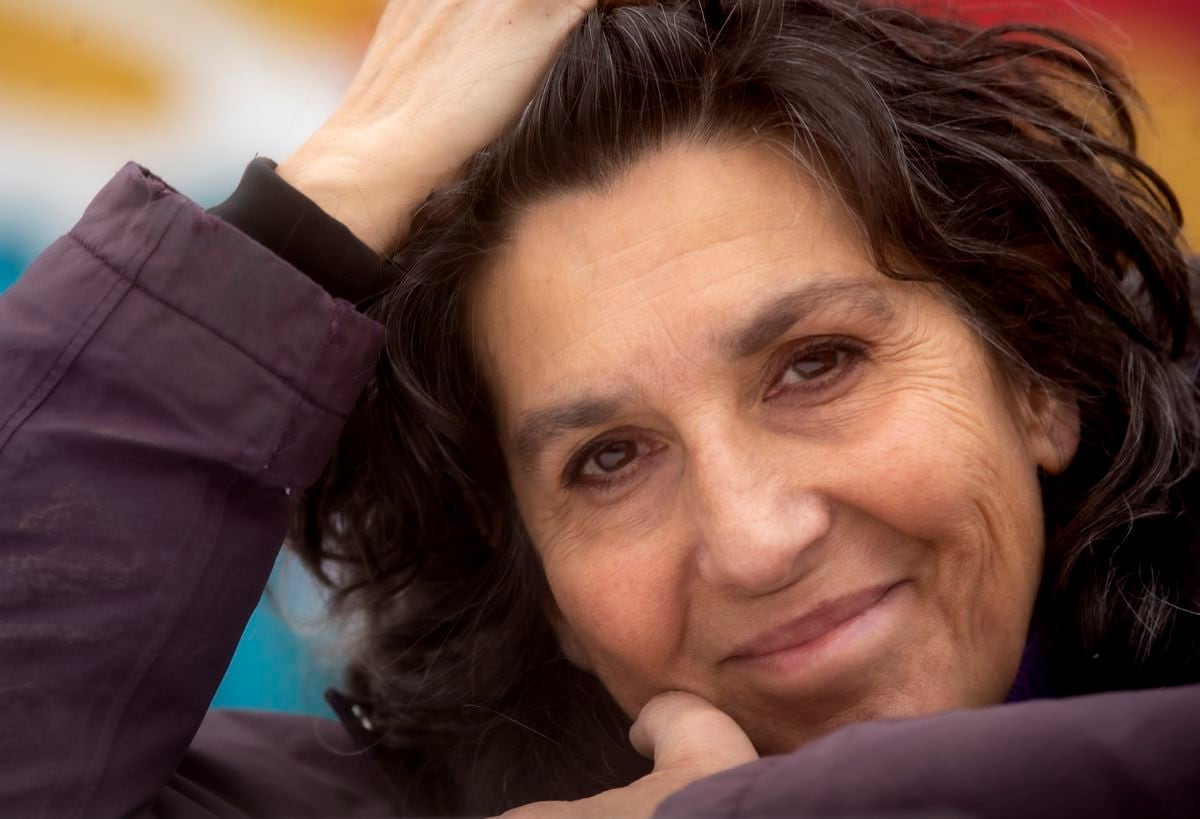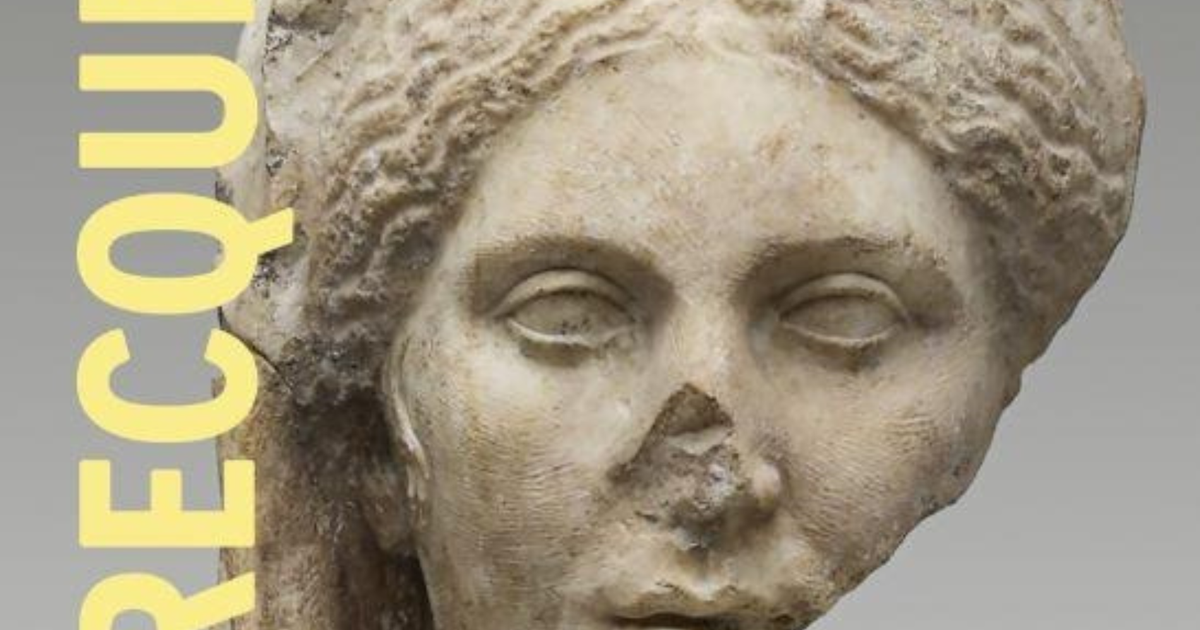"All children love their parents because they need them to survive, but not all fathers and mothers love their children."
The tremendous phrase of Elvira Mínguez at the presentation in Madrid of her first novel —by the journalist Carles Francino and the actor Rubén Ochandiano, close friends of the actress— left the audience that was packed with a knot in the stomach a couple of weeks ago the Machado bookstore, among which there was no more relative of the actress than her husband, José Carrasco and an elderly aunt with whom she had not seen for a long time.
With that sentence, Mínguez, extremely emotional, seemed to be referring not only to the plot of the book, but to something more personal and profound.
The quote that opens the volume: "And it will be the children who conspire against the silence of the parents to tear the earth from its shadow",
invented by the author imitating a supposed biblical verse, it abounds in that impression of reckoning.
We chatted a few days later in the café of the Ateneo de Madrid.
I start at the beginning.
Where did he keep, past 50, this hard and terrible story?
I guess in my subconscious.
There is a rage there against those mothers and those fathers.
Personal stuff.
From the shadow of one's own fears, to parts of myself that I don't want to see and I've gotten into the bag as a way to evolve, grow, mature.
I've had a lot of fun writing it.
Was it fun writing about family abuse and crime at 5am, before taking your 13-year-old son to school, as you say you did?
A lot.
Knowing that they are not exactly real facts, that daring to enter into the puns of your brain is a very interesting journey.
Writing the grotesque and scatological death of one of the
bad guys
was a joy.
He dedicates the book to his psychotherapist.
How vital is it in your life?
Yes. My Begoña.
There has been something in therapy that I really like and it is that invitation to narrate myself, with the good and the bad.
It helped me heal.
Look and look at me in the face in absolutely everything.
And that everything includes one's own wickedness and one's own hatred.
In the book, the women are the tough ones and the men are the tender ones.
Do you want to break stereotypes?
It is a conscious change not only of roles, but of my own mental construction.
I come from a tremendously macho family.
My mother, my father, my grandmother, my grandfather, my great-grandparents, they all were.
I cannot say that it is not, how can I not be, if I have sucked it, but I fight every day to make that investment.
All the characters I've played on film have been tough, self-sacrificing women who give up on themselves for others, and I was fed up.
I have created the characters that I would have liked to play, even if they are hateful.
Whole women, people, not half people.
I'm fed up with the characters they give me.
And I have written, among other things, to be able to direct them.
And then produce them.
I'm setting up the chiringo: since they don't give it to me outside, I set it up myself.
I have the whole movie in my head.
Those women in your book, with tremendous names, Garibalda, Atilana, Tránsito, seem to carry a terrible destiny written from the cradle.
The names are inspired by women in my family, but they are not them, of course.
My characters have been battered and abused women.
Psychologists say that these antecedents can be repeated up to six generations.
But it is also that they are women who are interested in power.
Because women can be evil, very ambitious and very bitches, using their children and manipulating them to their advantage to achieve or maintain power, inside and outside the home.
They are not saints, although they are pious.
It places the action in a lost town in Zamora.
His colleague and contemporary,
Carmelo Gómez
, also from a Castilian town, told my partner Rocío García that his father mistreated him as a child without knowing it.
Chance?
We are the product of an education and a determined Spain.
My novel takes place in 1896, but I could put it in 2023. According to statistics, right now, of the 35 children in a class, 5 may be suffering sexual abuse in the family.
Every time I hear about consent I wonder, who talks about consent when the abused is a child in her own family?
It seems very good to me that the Me Too comes out of the wings and the abuses of the Church, of the sacristy.
But this is the big shadow.
We still don't talk about intrafamily abuse.
Because if we did, we would be moving one of the most important pillars of the system: the family.
In 2006, I interviewed her for 'El País Semanal' and she was already lamenting the lack of interesting roles for actresses over 40.
Has anything changed since then?
Shit hasn't changed.
The patriarchal system lets us go three steps forward and then takes us back five.
What do we do then, give up?
Keep giving the rattle.
When they ask me if I am a feminist, I say that I am a woman and that I have been fighting against all kinds of systems all my life.
When I was almost a teenager, I left home, kicked my shoe, broke relations with everyone, started scrubbing stairs in Madrid and since then I have shaped my thinking against what I was supposed to do.
And I keep doing it.
I am not interested in anything that they say if I am a feminist or not: I am a free woman and I show it by being so.
What tolls have you paid?
Many.
Not having a family, for example.
But are yours alive?
Yes of course.
Not all.
Some, luckily, are dead.
my goodness...
Yes, you can already imagine what I'm talking about.
Of course I have paid tolls, because when I wanted to dot the i's, they told me to shut up and not make scandals.
I write to break the silences.
Haven't you ever been shaken by that determination, not even when you've fallen in love?
Not at all.
When I've fallen in love it's been like being hit on the head, but not in that area.
José, my husband, my partner, is as macho as I am, but every day we take great care of ourselves and we work so that our son breaks the chain and is clean of dust and straw.
That is the great work of my life, until I kick the bucket.
And I plan to live many years.
I have very broad shoulders.
She tells that, in Castilla, at the time she recreates in the book, there were women who committed suicide when they reached menopause to get out of the way.
It's scary.
Yes, it's called balance suicide.
They jumped into a well because they thought they no longer had anything to do on earth and they tied their skirts so that when they took them out their panties would not be seen.
Notice now.
We are now menopausal and have teenage children.
At home, my son and I are two trains running and at full speed.
Don't tell me that's not life.
She's an actress.
She has not touched up her face or dyed her gray hair.
Has she ever been tempted to do it?
Never.
I am a survivor and I am happy to have a birthday.
She had the cards marked for not having made it here alive.
On the contrary: my fight is not to retouch my photos.
The photographers insist on me and tell me that I am going to be the only one without retouching.
I have been told that I do not enter the editorial line of any women's magazine.
Well, okay, I don't go out: my wrinkles are my declaration of principles.
There are directors who do not want mature actresses with wrinkles or retouched.
What do they want?
It is perverse, because everything obeys the idea of patriarchal sex.
To the prototype of a woman that men want to see and want to fuck.
Making women attractive by trying to look more and more like girls is perverse.
She says she is fed up with the characters that are offered to her.
Which is it?
They pigeonhole you.
I have spent my life crying, but when I was younger, I also masturbated on stage.
They told me: you look in the mirror and you don't recognize yourself, and you start caressing yourself.
I have masturbated in bed, in the bathroom, in the bar, everywhere, and I was wondering: what kind of shit am I going to give the directors so that they ask me to masturbate all the time everywhere?
What image do you think you give today?
For the industry I am an actress of certain prestige.
Quite
mouthy
.
intense.
For the majority, a rare bird, one of those that must be rewarded when someone rewards it.
I have like a quality vitola [laughs], like cigars.
My husband jokes about it and he calls me “Vitola” because he knows that it bothers me, the whore vitola.
I already know if I've been good, but especially if I've been bad.
Self-esteem is also built, and I was not allowed to build it.
In the epilogue, he writes that I hope the reader liked his book, something unheard of in a writer.
Humility or flattery?
I could say something else to look good, but it's pure need for approval.
I have always sought to be loved, because at home they have not loved me.
We return to the usual: we are the consequence of who we were and were.
And have you achieved it?
What do they want me?
I love my son and my husband, they love me, and then there are my friends.
I have the family that I have chosen.
About the rest: I'm working on it, there's a long way to go, but I risk saying that I'm beginning to be at peace with myself.
ABOUT ELVIRA
Abuses between fathers and daughters, death, struggle for power, sex and, yes, also black humor in two families in a town in Zamora in 1896.
The Shadow of the Earth
, the first novel by actress Elvira Mínguez (Valladolid, 57 years) is too stark and powerful to be pure fiction.
Mínguez, who left his family home at a very young age and began cleaning premises and houses in Madrid to pay for acting classes, rose to great popularity with
Días contados
, the Imanol Uribe film in which he played an ETA member in love with his partner. Commando
,
played by Carmelo Gómez.
Later, she won the Goya for best supporting actress for her role in the film
Tapas.
, where he shared the limelight with Rubén Ochandiano.
Passionate about reading and writing, she took literary and script classes at Clara Obligado's school.
From several of her stories made then as a practical exercise, the germ of her first and recently published book was born.
Mínguez, mother of a 13-year-old teenager, has a pen for a while.
Subscribe to continue reading
Read without limits
Keep reading
I'm already a subscriber







/cloudfront-eu-central-1.images.arcpublishing.com/prisa/LRSWMXRGLREYHO2C6YULM5WE5M.jpg)
/cloudfront-eu-central-1.images.arcpublishing.com/prisa/WPELUPQUZNBGDDGMB6PTNPDWQ4.jpg)
